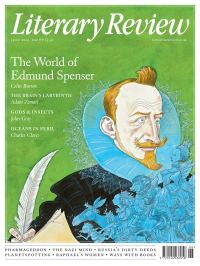Adam Zeman
Only Connect
Connectome: How the Brain’s Wiring Makes Us Who We Are
By Sebastian Seung
Allen Lane/The Penguin Press 359pp £20
Forest, jungle, labyrinth, maze – the human brain attracts dizzying analogies, and with good reason: our brains contain around one hundred thousand million nerve cells (neurons), linked by ‘millions of miles of gossamer neurites’ permitting around one thousand million million interconnections (synapses), the points at which cells exchange information with one another. It has long been thought that these interconnections provide a key to human nature: while the broad pattern of connections between brain regions is similar in every healthy human brain, their details – their number, size and strength – are thought to underpin our individuality, as synapses are ‘plastic’, shaped by experience. This shaping process obeys the ‘Hebbian rule’, named after the influential Canadian psychologist Donald Hebb, which dictates that ‘cells that fire together wire together’. It is the consistent coactivation of brain cells representing your kitchen or your beloved, for example, and the resulting synaptic changes in your brain, that allow you to summon them up in your mind’s eye without, I would imagine, too much trouble. The sum total of the connections within your brain, your ‘wiring diagram’, constitutes your ‘connectome’. In Sebastian Seung’s view, argued provocatively here, ‘you are your connectome’.
His book is an engaging introduction to the study of the human wiring diagram. This project has been given fresh impetus by some recent techniques facilitating the tracing of neuronal interconnections. These range from methods working at very fine scales, examining individual synapses in slices of brain under huge magnifications,

Sign Up to our newsletter
Receive free articles, highlights from the archive, news, details of prizes, and much more.@Lit_Review
Follow Literary Review on Twitter
Twitter Feed
It wasn’t until 1825 that Pepys’s diary became available for the first time. How it was eventually decrypted and published is a story of subterfuge and duplicity.
Kate Loveman tells the tale.
Kate Loveman - Publishing Pepys
Kate Loveman: Publishing Pepys
literaryreview.co.uk
Arthur Christopher Benson was a pillar of the Edwardian establishment. He was supremely well connected. As his newly published diaries reveal, he was also riotously indiscreet.
Piers Brendon compares Benson’s journals to others from the 20th century.
Piers Brendon - Land of Dopes & Tories
Piers Brendon: Land of Dopes & Tories - The Benson Diaries: Selections from the Diary of Arthur Christopher Benson by Eamon Duffy & Ronald Hyam (edd)
literaryreview.co.uk
Of the siblings Gwen and Augustus John, it is Augustus who has commanded most attention from collectors and connoisseurs.
Was he really the finer artist, asks Tanya Harrod, or is it time Gwen emerged from her brother’s shadow?
Tanya Harrod - Cut from the Same Canvas
Tanya Harrod: Cut from the Same Canvas - Artists, Siblings, Visionaries: The Lives and Loves of Gwen and Augustus John by Judith Mackrell
literaryreview.co.uk